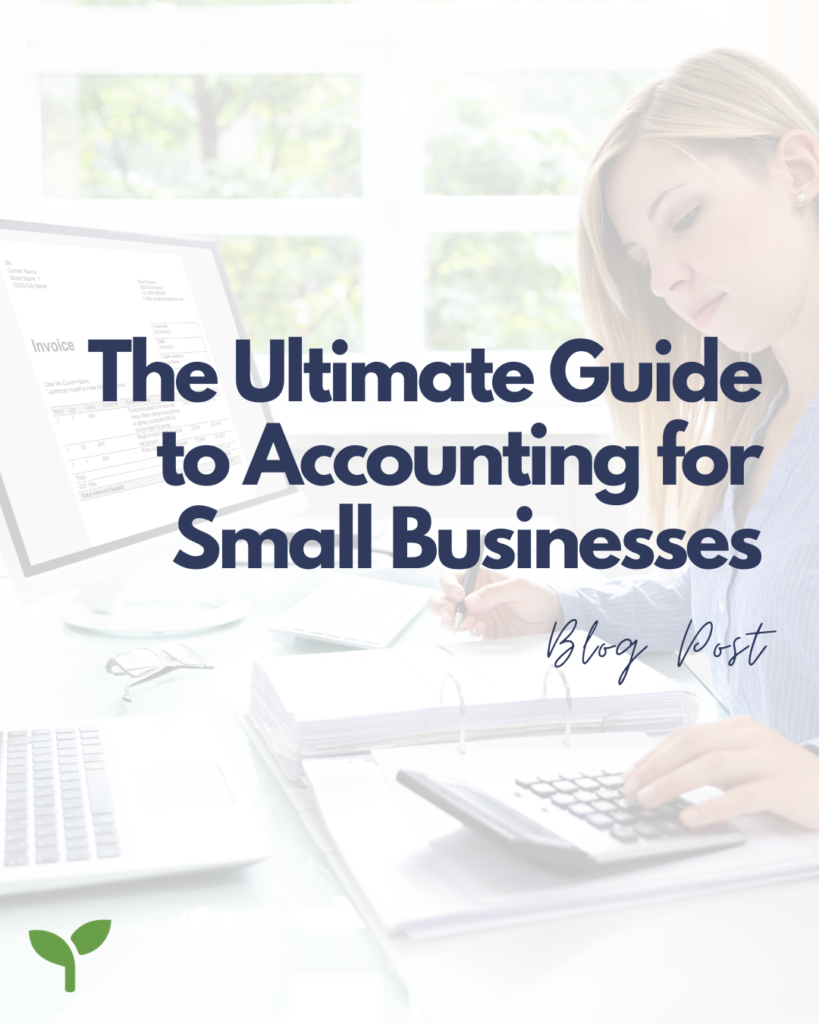
Mindset: Scarcity vs. Abundance Mentality
17th July 2023
Mindset: SMART Goals
17th August 2023Introduction
Accounting is an essential aspect of running a small business, yet it can be overwhelming for many entrepreneurs. However, with the right knowledge and tools, managing your business finances can become more efficient and less daunting. In this guide to accounting, we will walk you through the key concepts, best practices, and useful tips to help you navigate the world of accounting for small businesses.

Understanding Basic Accounting Principles
Before diving into the specifics, it’s crucial to grasp the fundamental principles of accounting. These principles include the concepts of bookkeeping understanding financial terms, the accounting equation (assets = liabilities + equity), accrual vs. cash basis accounting, and the importance of maintaining accurate and organised financial records.
Setting Up Your Accounting System
Choosing the right accounting system is vital for accurate and efficient financial management. You can opt for traditional spreadsheet-based systems or modern cloud-based accounting software like Xero or QuickBooks. Consider factors such as ease of use, scalability, cost, and integrations with other business tools when selecting a system that suits your needs.
Creating a Chart of Accounts
A chart of accounts is a categorised list of all the financial accounts used by your business. It helps you track income, expenses, assets, liabilities, and equity. Most accounting software, such as Xero, will automatically create a standardised Chart of Accounts for you. You can customize your chart of accounts to align with your business structure, industry, and reporting needs. Maintain consistency and avoid excessive account numbers to ensure clarity and simplicity in your financial statements.
Recording Transactions
Accurate and timely recording of financial transactions is the backbone of your accounting system. Implement a system for tracking sales, expenses, invoices, and receipts. Maintain supporting documentation such as receipts, invoices, and bank statements. Regularly reconcile your accounts to ensure accuracy and identify discrepancies. If you are using cloud accounting software, most of the banks will connect with the software to send through transactions every 24 hours (or more regularly for some!).
Managing Cash Flow
Cash flow management is crucial for the survival and growth of any small business. Create a cash flow statement to track the inflows and outflows of cash. (If you have good data in your software, you can probably generate this report without too much work). Monitor your cash flow regularly, identify potential bottlenecks, and implement strategies to improve cash flow, such as negotiating better payment terms with suppliers, managing inventory efficiently, and closely tracking accounts receivable.
Budgeting and Forecasting
Developing a budget and regularly reviewing your financial forecasts helps you set realistic financial goals, make informed decisions, and keep your business on track. Analyse historical data, market trends, and industry benchmarks to create accurate revenue and expense projections. Use budgeting tools or accounting software to monitor your progress and adjust your strategy accordingly.
Tax Compliance
Small businesses are subject to various tax obligations. Understand the tax regulations relevant to your business structure and industry. Keep track of important tax deadlines, maintain records, and consider consulting with a tax professional to ensure compliance and identify potential deductions or credits.
Financial Reporting and Analysis
Regular financial reporting provides valuable insights into the financial health of your business. Generate and review financial statements such as profit and loss (income statement), balance sheet, and statement of cash flows. Use key financial ratios and performance indicators to analyse trends, identify areas for improvement, and make informed business decisions. With good data, you can obtain all of this information from your cloud accounting software.
Engaging with Professionals
Consider hiring an accountant or bookkeeper to assist with complex accounting tasks, provide guidance, and ensure compliance. Their expertise can save you time, minimise errors, and help you focus on growing your business. If you decide to handle accounting yourself, invest in ongoing education and stay updated with changes in accounting standards and regulations.
Conclusion
Accounting may seem overwhelming at first, but with the right approach, tools, and understanding, it becomes an integral part of your business’s success. By following the principles and practices outlined in this ultimate guide, you’ll be better equipped to manage your finances, make informed decisions, and drive your small business towards long-term growth and profitability. Remember, accounting is not just a task to be completed; it’s a tool that empowers you to understand and optimise your business’s financial well-being.
Our Services
With us as your accountant, you can have peace of mind knowing that your financial matters are in capable hands. We prioritise accuracy, confidentiality, and integrity in all our interactions. By maintaining accurate financial records and ensuring compliance, we help you avoid penalties, investigations, and other financial headaches.
Ultimately, choosing us as your accountant means gaining a trusted partner who is dedicated to your business’s success. We strive to build long-term, relationships with our clients, providing exceptional service and support every step of the way. Contact us today to discuss how we can assist you in achieving your financial goals.




